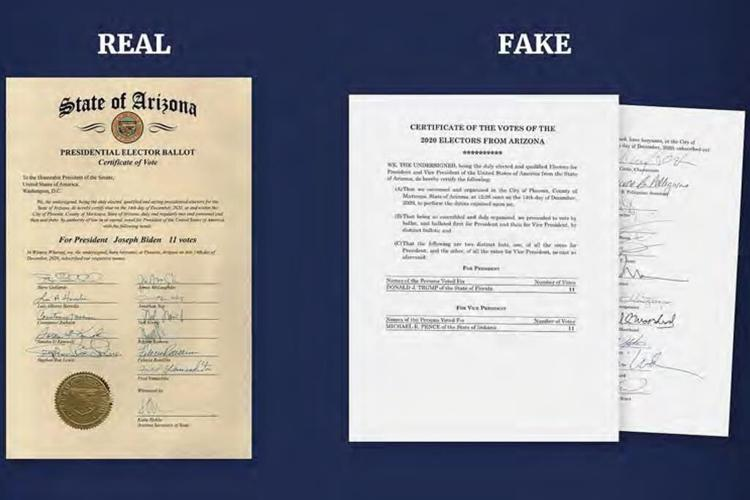
An Arizona grand jury's indictment of 18 people who either posed as or helped organize a slate of electors claiming Donald Trump won the state in 2020 could help shape the landscape of challenges to the 2024 election. (House Select Committee via AP)
An indictment handed down by an Arizona grand jury targeting 18 individuals involved in posing as or aiding the organization of fake electors, who falsely claimed that former President Donald Trump won the state in 2020, is expected to influence the landscape of challenges to the 2024 election. The indictment, issued on Wednesday, is part of a broader effort to deter a repeat of the events that unfolded in 2020, when Trump and his Republican allies propagated baseless claims of victory in swing states, initiated numerous unsuccessful lawsuits contesting Democrat Joe Biden's win, and attempted to overturn the election results through congressional intervention. This campaign reached its climax with the violent insurrection at the U.S. Capitol on January 6, 2021.
Consequences for those involved in this effort to subvert the democratic process have been accumulating steadily. Attorneys who supported Trump in his bid to overturn the election have faced censure, sanctions, and disbarment recommendations. Moreover, they have been subject to significant financial penalties resulting from libel lawsuits, along with facing criminal charges in multiple states for disseminating false information about the 2020 election. These efforts included the submission of counterfeit electors claiming that Trump had triumphed in these states and urging Congress to recognize them instead of the duly elected electors supporting Biden.
According to David Becker, the founder of the Center for Election Innovation & Research, and coauthor of “The Big Truth,” the actions taken against these individuals serve as a deterrent against future attempts to undermine elections. However, the legal repercussions extend beyond lower-level participants to include Trump himself, who faces federal charges for his role in attempting to overturn the election, as well as separate charges in Fulton County, Georgia. The Supreme Court recently heard arguments regarding Trump's claim of immunity from prosecution for actions taken while in office, with justices showing reluctance to grant such immunity, though they expressed concerns about the timing of the federal charges potentially delaying the case until after the 2024 election.
Justin Levitt, a former Department of Justice official, underscored the importance of swift and severe consequences for deterring similar actions in the future. While consequences have been slower to materialize for Trump himself, individuals involved in his election challenges, whom Levitt referred to as his “lieutenants,” have begun to face repercussions.
The recent indictments targeting so-called fake electors in Arizona, Michigan, and Nevada, along with a sweeping indictment in Georgia, represent some of the broadest consequences thus far. Notable figures among the 18 indicted in Arizona include Trump's former chief of staff, Mark Meadows, former New York Mayor Rudolph Giuliani, and Christina Bobb, a lawyer appointed as the Republican National Committee's head of “Election Integrity.” The indictment underscores the severity of the charges and the potential consequences for those involved in attempting to subvert democracy.
The significance of these indictments extends beyond legal ramifications to include broader societal implications. Adrian Fontes, Arizona's Democratic Secretary of State, emphasized the seriousness of these actions and their real-world consequences. The charges against individuals like John Eastman, who advised Trump on his legal strategies and now faces disbarment and criminal charges, underscore the gravity of the situation.
While some may view these actions as a form of partisan “lawfare,” prosecutors maintain that they are essential for safeguarding the integrity of future elections. The ongoing efforts to hold individuals accountable for their roles in perpetuating falsehoods about the 2020 election serve as a warning against future attempts to undermine democracy.















